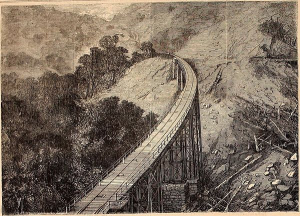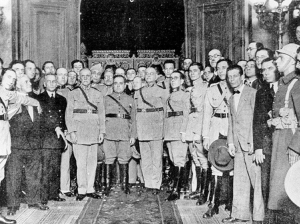The Serra Viaduct, São Paulo’s Railway, Brazil (Harper’s Weekly, Vol. 12, nº 623, 1868).
Getúlio Vargas e Junta Governativa (Arquivo Cordeiro de Farias, CPDOC, FGV)
World War I signaled a change in international power balances worldwide, and this affected Brazil. Before the war, England was Brazil’s most influential foreign power, with U.K. nationals holding most of the country’s debt and shares in many of its companies. However, as the United Kingdom became cash-strapped because of the war, the United States emerged as the ally able to provide Brazil with the consumer and credit market it needed. This gradual change in power relations was not immediate, or passive, however. Both the U.S. Department of State and the U.K.’s Foreign Office engaged in strategies to court and gain the favor of Brazilian authorities. Brazil at times embraced and at times resisted attempts seen as infringing on national sovereignty. Ultimately, however, technological changes and wealth rearrangements worldwide brought the inevitable rise of the United States as a rising world superpower and major ally of Brazil.
Brazil’s diplomatic corps, with a structure still reflected the attitudes of imperial times, engaged not only in commercial affairs, but also in so-called “anti-revolutionary” diplomacy, attempting to control immigration of undesidered people from Europe who could bring communitst and anarchist ideas into the country. Fear of external threats proved unfounded, however, as the First Republic ultimately fell due to divisions within the country’s elite, with the rise of Getúlio Vargas, and not because of foreign subversives. Vargas would govern the country through the repercussions of the 1929 Stock Market Crash, which saw the price of coffee, the country’s main commodity, implode.
Reading:
Emilio S. Rosenberg, “Anglo-American Economic Rivalry in Brazil During World War I” | English
Eugenio V. Garcia, “Anti Revolutionary Diplomacy in Oligarchic Brazil, 1919-1930” | English
Documents:
Seleção, Getúlio Vargas Speech at Esplanada do Castelo, January 2nd, 1930. | Português
Further readings:
Texto Completo, Discursos de Getúlio Vargas, Biblioteca Digital da Câmara dos Deputados | Português





